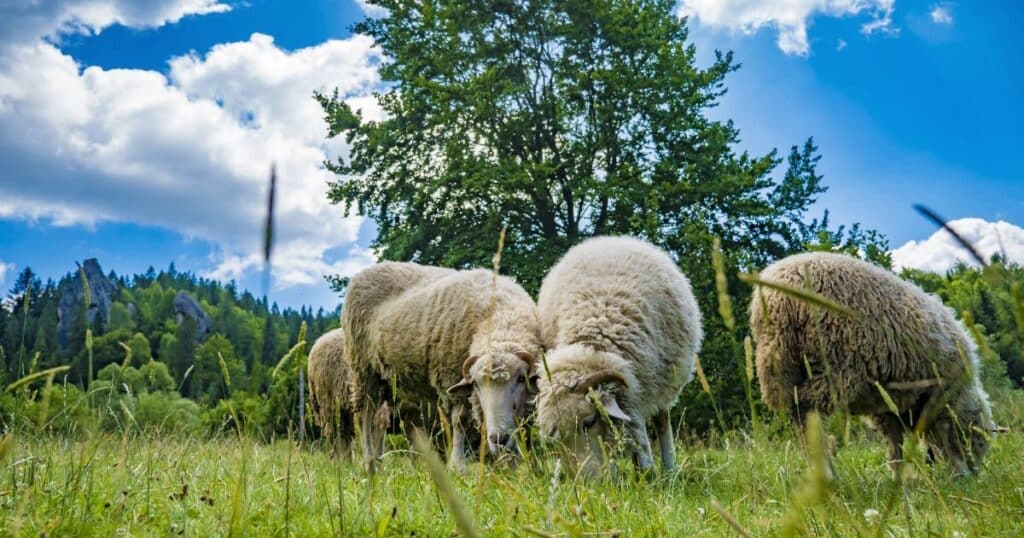Did you know that sheep are ruminants? Ruminants have a complex digestive system with multiple stomachs. It’s because sheep are ruminants that they need large amounts of food. Their bodies must expend energy in breaking down and digesting all that they eat. Now that you know sheep are ruminants, you still want to know: is a sheep a herbivore? Keep reading to find out.
Is a Sheep a Herbivore? (Answered)
The answer is a resounding yes – sheep are herbivores. A ruminant is a special type of herbivore, unique in that it has multiple stomachs. These stomachs are necessary because sheep and other ruminants need to break down and digest the high levels of cellulose in hay and grass to extract the nutrition in the food they eat.
If you have ever seen a sheep chewing something, you know now that it was chewing its cud.
Without the ruminant system, sheep wouldn’t be able to extract all the nutrients they need from their food.
The minimum amount of food a sheep needs to eat every day depends on its body weight. Your sheep will need approximately 0.03 pounds of hay or grass for every pound of its body weight.
For example, a sheep that weighs 100 pounds will need at least three pounds of grass or hay daily. A younger animal will need more food than this.
Also, you will need to increase feed for all your sheep during cold weather.
What Do Sheep Eat and What Should They Not Eat?
A sheep’s diet usually consists of grass and/or hay. Farmers will often give their flocks pastures with grass fields on which the animals can feed.
Rotating pasture systems are commonly used in the summer. This system involves letting sheep feed on a specific pasture until the grass starts to thin out, and then moving them to a fresh pasture.
A rotating pasture system is only possible if you have a very large property.
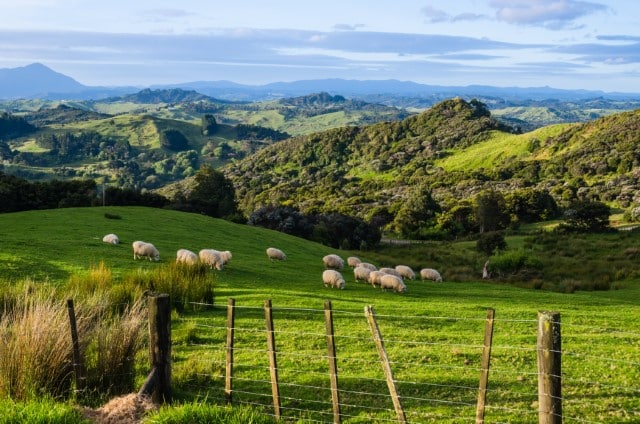
If you have your sheep feed on pastures, you must check them first to ensure there are no toxic weeds present. It will probably take quite a bit of time to do this, so plan accordingly.
Hay is a common type of feed for sheep in the winter months. Avoid alfalfa hay and go with normal hay instead.
The former has an excessively high amount of calcium for sheep.
Giving Treats to Sheep
You can give your sheep treats in moderation, as well. Examples of treats you can give these animals include small amounts of apples, carrots, and lettuce.
Make sure to cut these fruits and vegetables into very tiny pieces so there is no danger of choking. Also remove all apple seeds, as these are toxic for sheep.
Oats are another wonderful treat for sheep.
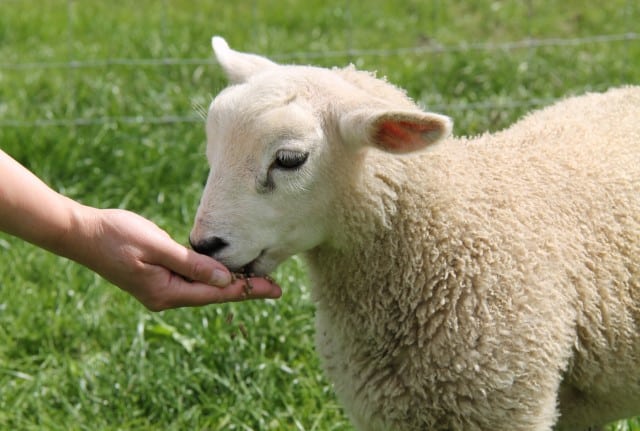
No matter what kind of treat you choose to give your sheep, never give them so much that the animals are so full that they won’t eat their regular food.
If this happens, malnutrition and poor health can quickly result.
Another common problem resulting from too many treats is stomach bloating that can be very uncomfortable for the animal.
Foods Sheep Shouldn’t Eat
There are several kinds of food that sheep shouldn’t eat. Here are some examples below.
Grain
You might be surprised to hear that grain can a problem for sheep. After all, it is found in many sheep grain formulas. However, sheep should only eat very small amounts of this kind of food, and it should be balanced with a good portion of forage (hay or grassland grazing). This is because grain tends to have too much fat and protein. If you feed too much grain to your sheep on an ongoing basis, the animals could end up with problems such as laminitis, kidney stones, and obesity.
Mineral Supplements Made for Other Species
It’s extremely dangerous to try to feed mineral supplements made for other kinds of animals to your sheep. It can even result in death. Any mineral supplements you give to your sheep should be specifically formulated and manufactured for sheep (more information on sheep licks here). The reason why mineral supplements made for other animals can be deadly for sheep is because they may contain minerals that are toxic for sheep. An example of this is the copper found in mineral supplements for goats. Copper is toxic for sheep.
Many Different Kinds of Human Foods
Examples of human foods that can be dangerous or, in some cases, deadly for your sheep include:
- Kale
- Dairy products
- Meat
- Chocolate
- Cabbage
- Potatoes
- Broccoli
- Avocado
- Turnips
- Tomatoes
Several Ornamental and Non-Forage Plants
There are many ornamental and non-forage plants that can be lethal for sheep. We will talk about these in a later section of the article.
Alfalfa
While Alfalfa can be one of the best foods for sheep, the high protein and calcium content of alfalfa can be too much for sheep. Excessive and continued feeding of sheep with alfalfa and alfalfa hay can lead to health problems such as kidney stones, urinary blockages, and obesity.
Sheep’s Favorite Herbaceous Plants
In addition to their staple grass, sheep love grass and a wide range of herbaceous plants. Let’s take a look at some of them below.
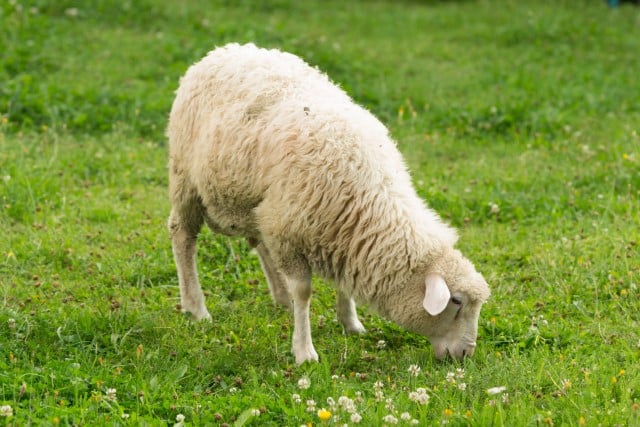
Common Mallow
The flowers and leaves of the Common Mallow both might be on your sheep’s menu. The animals won’t eat the stems though, as they are too tough and fibrous.
Broadleaf Plantain
If you live in the northwest, there is probably Broadleaf Plantain in your pastures. Sheep love eating this plant.
Perennial Sow Thistle
Sheep like to munch on the stalks, flowers, and leaves of the Perennial Sow Thistle.
Common Chicory
Sheep sometimes eat the blossoms, tips, and greens of Common Chicory. They never eat the stalk.
Varieties of Dandelion
Sheep like to eat the flowers and greens of dandelions.
Common Plants that Are Poisonous to Sheep
There are numerous common plants that are poisonous and potentially deadly to sheep. Make sure they don’t come anywhere near your flock.
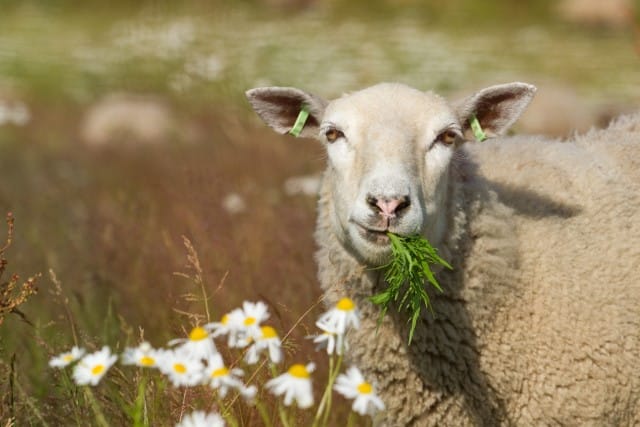
Examples of these include:
- Holly Trees
- St. John’s Wort
- Poppy
- Ponderosa Pine Trees
- Lilacs
- Lily of the Valley
- Cherry
- Red Maple Trees
- Cassava
- Plum Trees
- Red Maple Trees
- Azaleas
- Mountain Laurel
- Rhubarb
- Rhododendrons
- Oleander
- Hemlock
- Bracken Ferns
- Foxglove
- Chokecherry
- Yew Trees
- Nightshades
- Buttercup
- Milkweed
- Elderberry
Final Thoughts: Is a Sheep a Herbivore?
As we’ve learned here, yes, the sheep is a herbivore. This means that it only eats vegetation.
They’re also pretty selective in the kinds of vegetation they will eat.
If you’ve ever had goats, you know that they will eat pretty much anything. Sheep are much pickier.
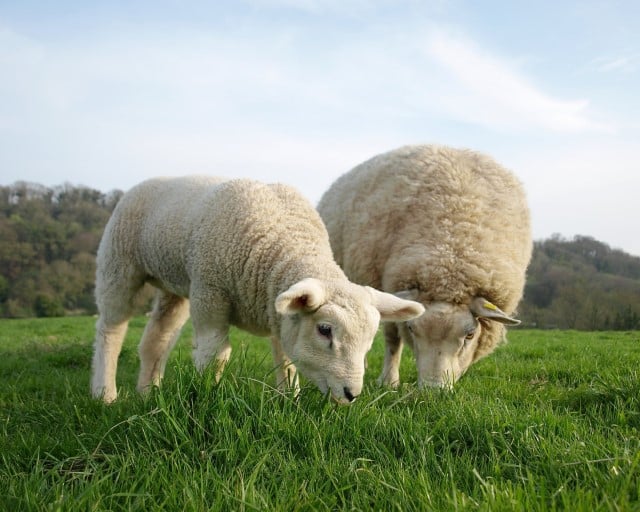
Now you know what sheep need, their diet, and what they enjoy as treats. If you have sheep, ask your vet for more thorough information on all their nutritional needs.

